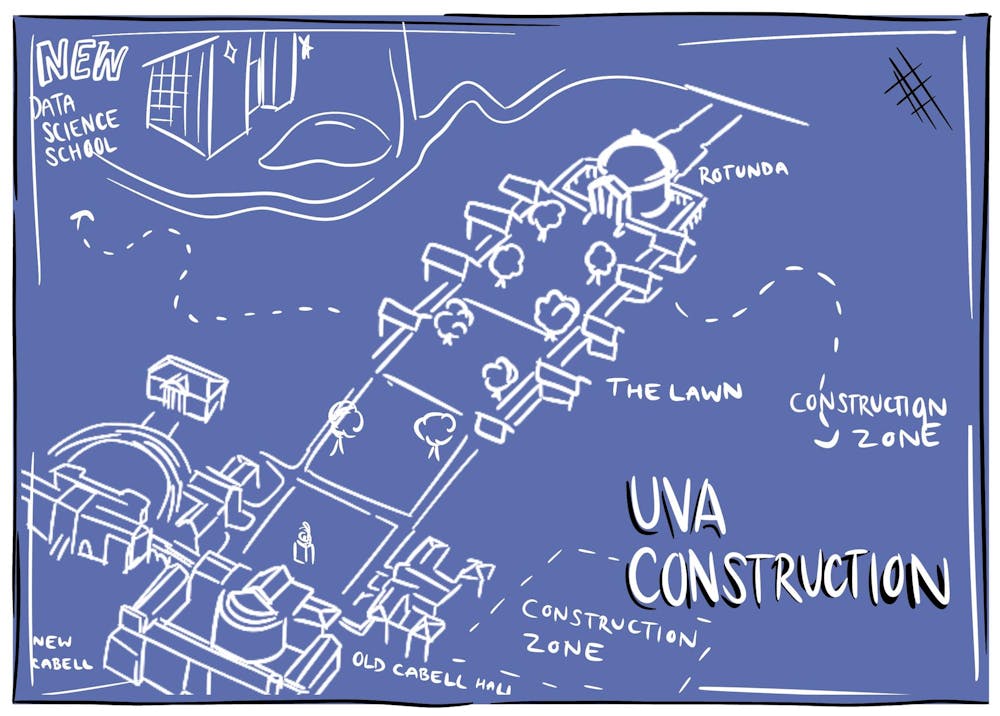The University is planning to expand yet again — the Board of Visitors Buildings and Grounds Committee has already chosen a site in the Emmet-Ivy area for new student housing. If all goes according to plan, this construction aims to accommodate all second-years in on-Grounds housing by the year 2030. To be clear, this is an exceptionally admirable goal — requiring second-years to live on-Grounds can foster a sense of community, alleviate the affordable housing crisis for Charlottesville residents and mitigate the stress of finding off-Grounds housing for students. But while the second-year housing expansion may be well intentioned, the manner in which it is being undertaken belies its fundamental goals. In fact, it is part of a barrage of large-scale construction projects which push the boundaries between the University and the neighboring Charlottesville community, projects which are so constant that they beg the question — will this expansion ever end?
As a community, we have every reason to believe that the answer to this question is “not anytime soon.” On the contrary, the sheer number of recent expansion projects, especially in the Emmet-Ivy corridor, suggests that this construction will be unending. The University’s new Data Science building just opened up this fall at the entrance of the corridor, with a new center for the Karsh Institute of Democracy, a hotel, a conference center and a performing and visual arts center to follow suit. Additionally, backed by millions of dollars in donor support, University Athletics is building a new football operations center and Olympic sports complex. This territorial expansion has gone so far as to extend to not only off Grounds but outside of Charlottesville, with the University’s new Northern Virginia campus scheduled to open in January 2025.
At surface level, these unapologetic and shiny expansions seem to advance the University’s overarching goal of becoming the best public university by 2030. But a dissonance exists between this goal and other, perhaps more fundamental, responsibilities of the University. For example, such expansions imperil the University’s stated goal of being a good neighbor for Charlottesville. Though all of the above expansions materially enrich the University student experience by offering state-of-the-art facilities and potentially advance University rankings, they also inevitably encroach upon the physical Charlottesville community — an encroachment which demands transparent conversation.
Indeed, the University has a historically poor track record of expanding its institution at the expense of and without including input from Charlottesville communities. Charlottesville residents, especially African American residents, will no doubt remember when the University, in an effort to expand the Academic Village, razed the Vinegar Hill community in 1965 without resident input. As a result, more than 600 Black families were forcefully displaced and over 30 Black-owned businesses were closed. Even the University Health Center was built on the displacement of working-class Black communities in Gospel Hill in the 1970s and 80s. The University simply cannot allow such detrimental history to repeat itself today.
With recent expansion decisions undertaken by the administration, we cannot help but wonder which community establishment or neighborhood will soon be forced to cede to the University’s advances. To what extent will we just repeat past mistakes of excluding community voices and thereby exacerbate feelings of alienation, trauma and distrust among our neighbors in the Charlottesville community? Though some community solicitation about construction decisions has been done in the past, a recent decision directly opposing local support suggests that the University is an institution which prioritizes expansion — and the boost to its national rankings and prestige that such expansion brings — at all costs. These are the wrong priorities for an educational institution like the University.
It is true that college campus expansion is not a phenomenon unique to the University. Nor is expansion inherently a bad thing. What we take issue with, then, is the manner in which this expansion has been undertaken. Increased second-year housing, for instance, is one solution which could alleviate the Charlottesville affordable housing crisis. However, this laudable goal should not be co-opted by the University as a means to achieve better rankings. If the University were truly committed to its implicit two-pronged mission of benefiting its students and its Charlottesville neighbors, it would do more to spearhead productive and transparent conversations that actually include community voices. Through such conversations, the University can begin to promote a more sustainable expansion of Grounds and mend its fraught relationships with the Charlottesville community.
Today, the University has moved far beyond the old plan of redeveloping and renovating existing facilities and has instead begun implementing a sprawling geographical expansion reliant upon shiny new property acquisitions and even shinier floor plans. They have rhetorically foregrounded student experience, as defined by material and shiny objects, over a genuine and intentional relationship to both the Charlottesville community and the educational — not material — mission of the University. Ultimately, however, the University’s endless climb towards excellence will be for naught if the administration continues to prioritize ratings and prestige over the welfare of local communities. So, before soliciting requests from alumni for new building name ideas, the University should instead solicit feedback from the very community its construction will impact.
The Cavalier Daily Editorial Board is composed of the Executive Editor, the Editor-in-Chief, the two Opinion Editors and the two Senior Associates. The board can be reached at eb@cavalierdaily.com.







